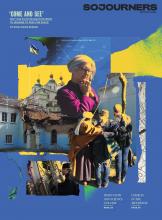IT'S CLICHÉ AT this point to call television dramas with rich storytelling and emotional depth (think The Wire and Breaking Bad) novelistic. But no show may be more novelistic than Pachinko on Apple TV+. Like the book by Min Jin Lee on which it is based, Pachinko encompasses four generations of a Korean family, following them from Korea to Japan throughout much of the 20th century. But while the book moves linearly, the TV show shifts back and forth from 1989 to the 1920s onward, with one actor (Minha Kim) playing the protagonist Sunja when she is a young woman and another (Oscar-winner Yuh-Jung Youn from Minari) when she is a grandmother.
Hollywood often seems to assume that viewers need stories that match our limited comprehension. But lately there’s been a shift, with Korean artistry initiating the move. Hollywood, uncharacteristically, embraced the South Korean thriller Parasite, the first non-English-language film to win Best Picture at the Oscars, and went equally wild for the South Korean TV drama Squid Game, the first non-English-language show nominated for Screen Actors Guild Awards (winning three). Subtitles—kisses of obscurity in Hollywood—become something sweeter: Trust? If so, Pachinko puts double the faith in non-Korean- and non-Japanese-speaking viewers, subtitling the Korean in yellow and the Japanese in blue and juxtaposing the colors when both languages flow from a character's mouth in a single line of dialogue. At times, the bottom of the screen resembles Vincent van Gogh’s “The Starry Night.”
Read the Full Article

